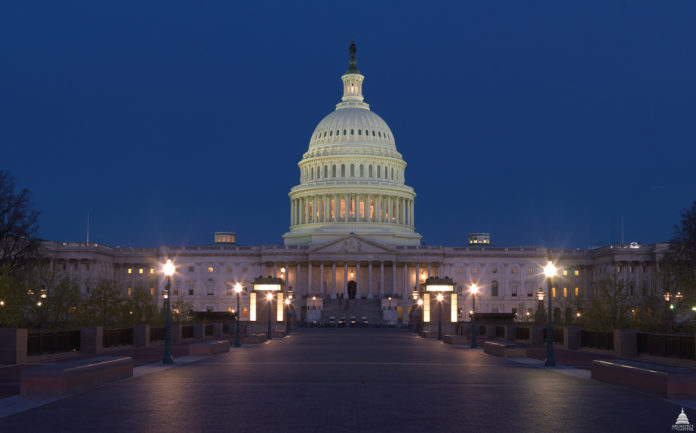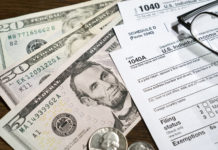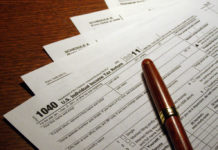Republican U.S. Sens. Jerry Moran and Pat Roberts say they’re reluctant to move quickly to give states more money to fill deep budget holes created by efforts to control the coronavirus.
“I don’t think it’s the responsibility of Kansas taxpayers to help states and localities to recover from their ill-advised poor judgment of spending more money than they are capable of affording,” Moran said Friday morning.
Moran made his comments during a news conference held by the University of Kansas Health System that was broadcast on Facebook.
His comments came two days after Senate Majority Leader Mitch McConnell said states should be allowed to declare bankruptcy rather than sending them more money to dig out of a financial hole.
Moran said he didn’t want to couch the issue as McConnell did but said he didn’t think the federal government should bail out bad fiscal decisions made by state governments.
“We do not have the ability to continue to spend at the rate we are spending now,” Moran said.
“The best way to get relief to people beyond health care is an economy that is working and that people are back to work and are capable of taking care of themselves and paying taxes,” he said.
Moran said Kansans “should not bail out irresponsible decisions made in the past,” he said.
He said Congress has already helped states and local governments with money appropriated to respond to the coronavirus pandemic.
“I’m still interested in being helpful to cities and counties in Kansas and across the country to recover from this virus,” he said.
Gov. Laura Kelly on Friday sent a letter to the state’s congressional delegation asking for more direct aid.
“Although federal aid made available up to this point will enhance Kansas’ immediate coronavirus response efforts, it lacks the flexibility necessary to adequately meet the needs of Kansas communities for the duration of this pandemic,” Kelly said in the letter.
Kansas is facing a $1.3 billion deficit amid the pandemic, which led to a series of state and local restrictions on movement and mass gatherings that have closed thousands of businesses and put millions out of work nationally.
The slowdown of the economy amid the pandemic has led state fiscal forecasters to sharply reduce revenue projections for the current fiscal year and next.
Kansas state government is expected to receive $1.25 billion in stimulus dollars, but that is limited to direct costs related to fighting the coronavirus and cannot be used to backfill state revenue losses.
The governor said she hoped the stimulus money would have provided the money the state needs to make investments that would help spur the economic recovery.
“I am gravely concerned that states are prohibited from using COVID-19 relief funds to supplant lost general fund revenue,” the governor said.
The Treasury Department this week issued new guidance on how the stimulus money can be spent.
“Funds may not be used to fill shortfalls in government revenue to cover expenditures that would not otherwise qualify under the statute,” the department’s guidelines said.
“Although a broad range of uses is allowed, revenue replacement is not a permissible use of fund payments.”
Eligible expenditures include providing COVID-19 testing.
They also include the purchase of medical and protective supplies, including sanitizing products and personal protective equipment for medical personnel, police officers, social workers and child welfare officers, among others.
Meanwhile, states across the country are asking Congress to provide more money with the flexibility of using the funds to help cover revenue deficits.
Overall state deficits across the country are estimated to run anywhere from $150 billion to $500 billion for single year.
The executive director of the National Conference of State Legislatures sent a letter last week to congressional leadership asking for $300 billion that could be used to make up for revenue declines.
The NCSL projects revenue losses of between 15% and 20% in nearly every state, meaning a total loss nationally of between $300 billion and $400 billion.
The National Governors Association is seeking $500 billion.
Earlier this week, McConnell told Fox News that the Senate wasn’t interested in “revenue replacement” for states.
“We’re interested in trying to help them with anything related to the coronavirus,” he said.
“We’re not interested in solving their pension problems or all these other things they would like for us to finance,” he said.
In her letter, Kelly said it was not a “reasonable” or “responsible” option for states to seek bankruptcy.
“As governor, I have diligently worked to put Kansas’ fiscal house in order,” the governor said in her letter.
“Throughout my first two years in office, I offered structurally balanced budgets that left the largest ending balance in two decades,” she wrote.
Kansas was expected to end the current fiscal year on June 30 with about $900 million on hand. It will be depleted to about $200 million because of the shortfall.
The state expected to have an ending balance of $731 million at the end of 2021. It is now expected to run a deficit of $653 million in 2021.
McConnell said the Senate was taking a pause and would wait until the chamber returns May 4 to weigh the impact of what Congress has already spent.
Like McConnell, Roberts said he wasn’t in a hurry to pass another stimulus bill.
“Congress moved rapidly to give immediate aid and security to Americans and businesses with four different measures that are still being implemented,” Roberts said in a statement.
“I agree with the Leader that we need a little more time for those efforts to take effect,” he said.
“Then we can look at new initiatives as well as improvements we might need to make to the laws just enacted.
“I’m talking with Kansans every day about the real life impacts as I start working on the next step of federal legislation.”
Republican Congressman Ron Estes expressed a similar reluctance about passing a stimulus bill for states.
He points out the state is already benefiting from billions in stimulus dollars.
Kansas is expected to receive $2.1 billion overall in coronavirus relief funding, including $1.25 billion for state government, $216 million for education, nearly $356 million for health care, $59 million for social services and $144 million for transportation.
“Congress has appropriated billions of dollars to assist state and local governments, but our focus has always been on the workers and families that have been negatively impacted by this pandemic,” Estes said in a statement.
“As the former state treasurer of Kansas, I understand how difficult it is to balance state budgets and make hard choices.
“But Congress doesn’t need to bail out state and local governments any more than we already have.
“It’s yet another reason why Kansas needs a clear plan to safely reopen, allowing us to get back to our recently-booming economy.”
Democratic Congresswoman Sharice Davids said the coronavirus is unwinding all of the work that Kelly has done to try to stabilize the budget as governor.
“Kansas has just begun to recover from the Great Recession and Sam Brownback’s failed tax experiment, both of which devastated our state’s budget and caused massive cuts to our public schools, roads, and much more,” Davids said in a statement.
“Congress must ensure that our state and local governments can receive direct, flexible aid in the next COVID-19 response package so they can continue to provide the strong public education, health care, infrastructure, and more that Kansas families depend on,” she said.
A statement from U.S. Rep. Roger Marshall about stimulus requests from the states to help cover budget shortfalls was not available Friday.
Republican Congressman Steve Watkins’ office did not respond to requests for comment.
















